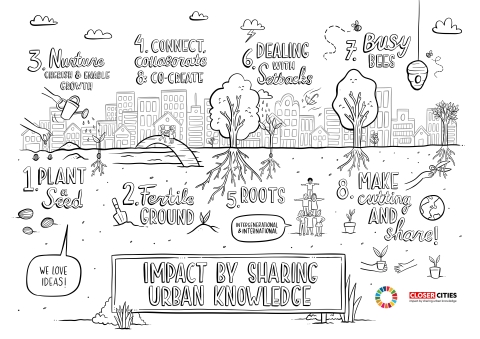About Closer Cities
We believe that cities can make good use of each other’s knowledge and experiences. However, sharing such knowledge is a difficult task for many reasons. By developing a better understanding of urban knowledge transfer and putting this understanding into practice, this scientific research project aims to contribute to the realisation of the Sustainable Development Goals. It is our mission to make currently “invisible” knowledge, tied to its origin and unrecognized by the larger urban community, visible and shareable.
On our research-driven platform, we connect urban science to urban practise. Urban actors share their projects and the lessons they learned along the way as "cases". Scientists from various universities study the cases and examine the factors that contribute to the “shareability” of urban projects.
The leading questions are: How can the worldwide exchange of urban knowledge be optimised? How can optimising knowledge exchange contribute to reaching the UN Sustainable Development Goals? The Closer Cities project aims to answer these questions and help urban actors share their expertise.
We define urban actors as any person who has initiated or contributed to a project for the improvement of an urban area. A project can be both formal and informal, there are no limits as to what is considered “shareworthy.” Urban actors are citizens, urban professionals, city planners, engineers, NGOs, and many more. We want to provide this platform to all whose ideas may help others around the world in creating a sustainable, healthy and resilient living environment.
Our motivation and commitment
Closer Cities’ founding partners are highly motivated and committed to optimise the sharing of urban knowledge. Hence, the project is a non-profit initiative and made available as open source. We use the UN Sustainable Development Goals as guiding principles in defining sustainable projects and aspire to contribute to their achievement by conducting research specifically on how they apply to the urban context. Closer Cities is not just another ‘best practice’ platform – our online platform is a method, a way to collect important data which our affiliated researchers can then analyse. The scientific insights obtained will be shared on the platform and applied in practice, in cities all around the world.
Why would you be part of the project?
The Closer Cities project as a valuable opportunity. This research-oriented platform enables you to share a project with other professionals and scientists and make use of other shared information in your own practice - for free. If many of us (practitioners, scientists, others) contribute, this will make a major contribution to the research and data analysis.
How does the platform work?
We are inspired by nature in creating this movement - specifically the planting of a seed to harvesting of fruit. By sharing their projects via the case submission forms, urban actors are providing the seeds. The cases are automatically uploaded to the Closer Cities platform - the seeds are planted in the minds of others. The provided answers enable us to uncover connections between the selected topics, locations, SDGs and more. By analysing the data on how visitors perceive and share the collected cases, we aim to find out which factors influence the 'shareability' of urban projects. The results of these analyses will be shared on the online platform, in order to help cities share their projects and collect the information that could improve their own urban environment - harvesting the fruit of shared knowledge. All of the information we collect and analyse is accessible and free of charge.

Sharing
There are many ways urban knowledge can be shared, and sharing is thus a broad concept. 'Sharing' can also be interpreted broadly within Closer Cities: you can share your project on the digital platform (for inspiration), but sharing can also mean that someone else is keen to take parts of your project (or the entire project) and implement these in their own city. We also share knowledge through the expert meetings we will organise in the coming years.
One aspect involves the questions: how shareable is urban knowledge, and how can urban projects be translated to other local contexts? We look into sharing urban knowledge on the whole, but also examine specific issues, such as bike-sharing systems, the approach to green roofs, energy transition, projects for refugees, reducing loneliness in the elderly, how cities are dealing with COVID-19, the water-energy-food nexus, etc.
